|
|
|
Sort Order |
|
|
|
Items / Page
|
|
|
|
|
|
|
| Srl | Item |
| 1 |
ID:
159413
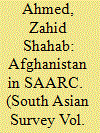

|
|
|
|
|
| Summary/Abstract |
Ever since the formation of the South Asian Association for Regional Cooperation
(SAARC) in 1985, the motivation for the expansion of the Association has been
expressed by its founding members. The prospective expansion comes naturally
to international organisations (IOs), visible in the increase in membership of
the European Union (EU) from six to 28 European countries. Similarly, the
Association of Southeast Asian Nations (ASEAN) has doubled its membership
since its inception. SAARC membership grew in 2007, with the inclusion of
Afghanistan. Yet, there is limited assessment on the opportunities and challenges
that have arisen since Afghanistan’s arrival in SAARC 10 years ago. This article
provides an evaluation of Afghanistan within SAARC, and a further comparison
to processes of enlargement in the EU and ASEAN. It is argued that Afghanistan’s
membership poses significant challenges for SAARC, owing to its political instability.
Its stature as a war-torn country has meant that it has failed to prioritise its role
in the Association. Furthermore, the membership of Afghanistan has significantly
contributed to the conflict relationship between Afghanistan and Pakistan, further
constraining SAARC processes and agendas.
|
|
|
|
|
|
|
|
|
|
|
|
|
|
|
|
| 2 |
ID:
081695
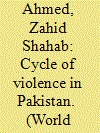

|
|
|
| 3 |
ID:
183876
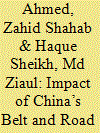

|
|
|
|
|
| Summary/Abstract |
By focusing on domestic and geopolitical factors, this study aims to understand the impacts of China’s Belt and Road Initiative (BRI) on regional stability in South Asia. It critically examines China’s investments in Bangladesh, the Maldives, Nepal, Pakistan and Sri Lanka to understand how that impacts local economies and politics as well as the geopolitical climate considering the rivalry between China and India. As China seeks to promote alternatives for its partners to decrease their dependence on India and India-dominated institutions, there appears to be a negative impact of the geostrategic competition between China and India on South Asian regionalism. China’s economic influence varies and the evidence from Sri Lanka and Pakistan suggests that Beijing fully controls the deep seaports that it has built through BRI. While Beijing has engaged with a variety of political actors in the selected countries, it has not tried to influence domestic politics.
|
|
|
|
|
|
|
|
|
|
|
|
|
|
|
|
| 4 |
ID:
164766
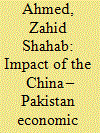

|
|
|
|
|
| Summary/Abstract |
Since the beginning of bilateral ties in 1950, the China–Pakistan relationship has grown significantly. Known as Pakistan’s ‘all-weather friend’, bilateral economic cooperation has been advanced by the China–Pakistan Economic Corridor (CPEC) agreement, worth US$62 billion of Chinese investment in Pakistan. Due to its geo-economic and geopolitical importance, the CPEC is considered a ‘game changer’ by Beijing and Islamabad. However, since its initiation in 2015, the CPEC has also been a source of tension between centre and provincial governments in Pakistan. This paper analyses the impact of the CPEC on nation-building in Pakistan. In the light of nation-building theories, it further argues that the CPEC has provided Pakistan with much-needed opportunities to address inter-provincial and federal–provincial discord through dialogue and compromises.
|
|
|
|
|
|
|
|
|
|
|
|
|
|
|
|
| 5 |
ID:
188243
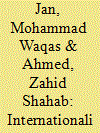

|
|
|
|
|
| Summary/Abstract |
No other issue has influenced the India–Pakistan relationship more adversely than the Jammu and Kashmir dispute. To understand the discourse surrounding the dispute, and how it has evolved within the foreign policies of both countries, this research undertakes a critical discourse analysis of both countries’ official statements at the United Nations General Assembly (UNGA) between 1948 and 2020. The findings of this study are crucial to not only understanding how the two states have been internationalizing the Kashmir dispute but also what lessons can be learned from the past as both countries attempt to slowly reengage with one another. Our analysis points to the fact that both India and Pakistan’s stances on the Kashmir dispute, despite their varying phases throughout the conflict, have essentially remained the same. We argue that, despite seeming to have converged toward some form of resolution during the first decade of the twenty-first century, the current context of India–Pakistan relations presents a worsening trajectory that has not been witnessed since their last major war in 1971. In highlighting the cyclical, almost scripted nature of this debate, this paper attempts to suggest ways to break free from age-old tropes and help pave the way toward more meaningful ways to redefine the issue in light of a radically altered geo-political context.
|
|
|
|
|
|
|
|
|
|
|
|
|
|
|
|
| 6 |
ID:
193195
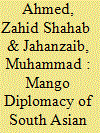

|
|
|
|
|
| Summary/Abstract |
This article examines the mango diplomacy of South Asia’s mango exporting countries. Diplomatic gifts are a common feature of public diplomacy of diplomatic missions globally. There are many prominent examples of that including China’s panda diplomacy and mango diplomacy of South Asia’s mango exporting countries like Bangladesh, India and Pakistan. Based on the analysis, this study argues that Pakistan is a dominant actor in terms of mango diplomacy and has an extensive strategy, for example, including mango exhibitions, to increase its mango exports and goodwill in target countries.
|
|
|
|
|
|
|
|
|
|
|
|
|
|
|
|
| 7 |
ID:
176578
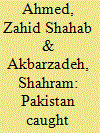

|
|
|
|
|
| Summary/Abstract |
Pakistan claims to maintain neutrality in the Iran–Saudi rift. Sustaining this approach, however, has been problematic against a backdrop of intensifying Iran–Saudi rivalry. Pakistan’s choices suggest a tilt towards Saudi Arabia. Based on extensive fieldwork in Islamabad, this paper focuses on the meanings and uses of neutrality in Pakistan’s foreign policy. The paper argues that Pakistan cannot be neutral due to its stronger cultural, economic and defence ties with Saudi Arabia but it promotes this rhetoric due to a combination of demographic, geographic and geopolitical factors. Islamabad’s claim of neutrality serves the dual purpose of the national interests in relation to domestic and foreign affairs. Based on its economic, sectarian and geopolitical realities, Pakistan desires a neutrality in the Iranian-Saudi rivalry but it is very difficult because it has strong and multifaceted relations with Saudi Arabia. Based on the assessment of Pakistan’s foreign policy choices, we argue that Pakistan continues to lean away from Iran towards Saudi Arabia.
|
|
|
|
|
|
|
|
|
|
|
|
|
|
|
|
| 8 |
ID:
077770
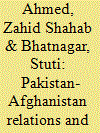

|
|
|
| 9 |
ID:
157486
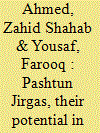

|
|
|
|
|
| Summary/Abstract |
Relations between Pakistan and Afghanistan have mostly been hostile since 1947. The animosity has grown in complexity from various territorial disputes to frequent allegations of cross-border terrorism in the post-9/11 era. This article first makes a case for involving Jirgas, a traditional dispute resolution mechanism among Pashtuns, for improving peace dialogues between both countries. It presents evidence of the traditional acceptability of Jirgas by Pashtuns on both sides of the border and assesses previous official bilateral attempts of using Jirgas. It then proceeds to propose some new policy recommendations focused on national reconstruction of Afghanistan, which include involvement of the Taliban as an important local stakeholder. The dual key argument then becomes, first, that since Jirgas have long-standing local legitimacy and acceptability both in Afghanistan and Pakistan, using the strength of their social recognition would allow higher-level bilateral negotiations between the neighbours, enhancing the effectiveness of new and locally more credible forms of multi-track diplomacy. Second, reinvigorating the Jirga system would allow the Afghan people themselves to engage in fuller multi-dimensional debates on sustainable modalities for their own future, on terms to be set by them, not outsiders.
|
|
|
|
|
|
|
|
|
|
|
|
|
|
|
|
| 10 |
ID:
189523
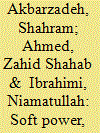

|
|
|
|
|
| Summary/Abstract |
The concept of soft power was developed at the end of the Cold War to examine international influence through non-coercive means. In recent years, a growing field of research has drawn on this concept to examine the role of religion and culture in the foreign policies of Middle Eastern states. The existing research tends to view soft power from the perspectives of states that project such influence, not the impact of these policies on target societies, and tends to overlook the relationship between hard and soft power strategies. To address this gap, we draw on an original survey data and face-to-face interviews to evaluate Iran’s influence in Afghanistan. This study examines the response in Afghanistan to key pillars of Iranian soft power projection: the role of shared language and culture, religion and Tehran’s Third Worldist ideology of resistance against Western powers. This research finds that Iran’s soft power projection strategy is undermined by structural hard power imbalances between the two countries and Tehran’s contradictory policies towards Afghanistan.
|
|
|
|
|
|
|
|
|
|
|
|
|
|
|
|
| 11 |
ID:
165690
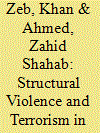

|
|
|
|
|
| Summary/Abstract |
The Federally Administered Tribal Areas (FATA) of Pakistan came under the international spotlight following the US-led invasion of Afghanistan in 2001.Mainly due to being a semi-autonomous region where British-colonial-era laws were practised until May 2018, FATA remains one of the most marginalised and insecure areas of Pakistan. Based on Galtung’s structural violence theory, this paper examines the nexus between the region’s socio-economic and political realities and terrorism. Through primary and secondary data, this paper argues that economic marginalisation and the lack of political and individual freedom of the tribal people are root causes of the instability in FATA.
|
|
|
|
|
|
|
|
|
|
|
|
|
|
|
|
| 12 |
ID:
163897
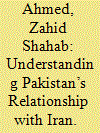

|
|
|
|
|
| Summary/Abstract |
Scholarship on Pakistan’s relations with its neighbors predominantly focuses on India, Afghanistan and, most recently, China. Little research is conducted on relations between Pakistan and Iran. This is an obvious gap, given the cultural and religious links between these two neighbors that share a 909‐kilometer border.
|
|
|
|
|
|
|
|
|
|
|
|
|
|
|
|
| 13 |
ID:
178398
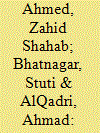

|
|
|
|
|
| Summary/Abstract |
In Kashmir, the worst fallout from the current state of India and Pakistan’s confrontations at the Line of Control (LoC) is the total disregard for the 2003 ceasefire agreement. While political parties, governments and armed forces on both sides of the conflict are key actors in the current dynamics, also stationed on the LoC are military observers as part of the United Nations Military Observer Group in India and Pakistan (UNMOGIP), first instituted in 1949. While India is opposed to the presence of the UN military observers, little is known about the perceptions of the group’s role and its potential capacity to play a constructive role in keeping peace along the border. This research project is an endeavour to gain this understanding based on the views of selected elites and opinion makers in India and Pakistan. The data points to challenges to UNMOGIP’s mandate following the Simla Agreement of 1972 and the change in the status of the ceasefire line to the LoC. Compounded further by the severity of the conflict between India and Pakistan, New Delhi’s opposition to UNMOGIP’s mandate further weakened its operational capacity to effectively monitor and report ceasefire violations.
|
|
|
|
|
|
|
|
|
|
|
|
|
|
|
|
|
|
|
|
|